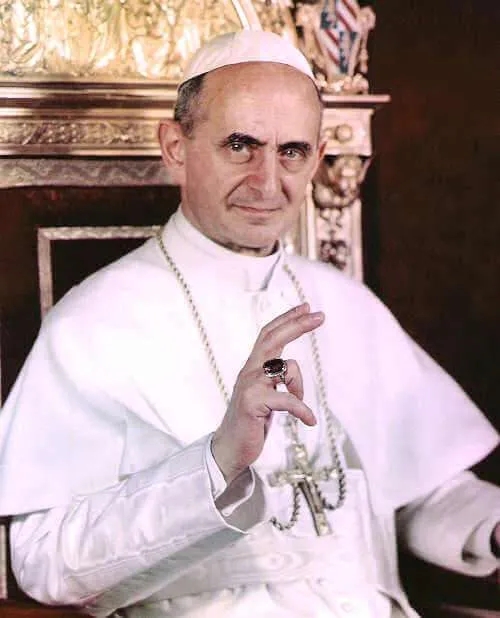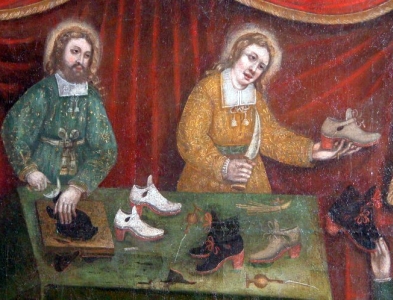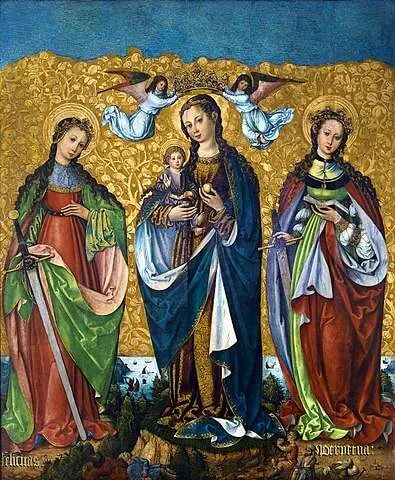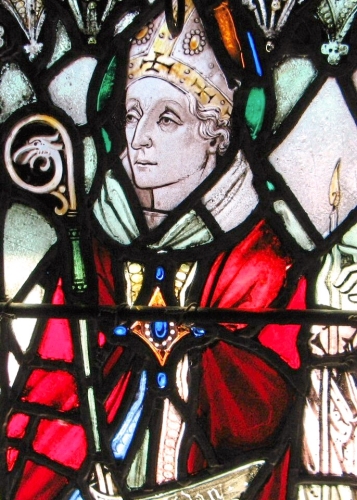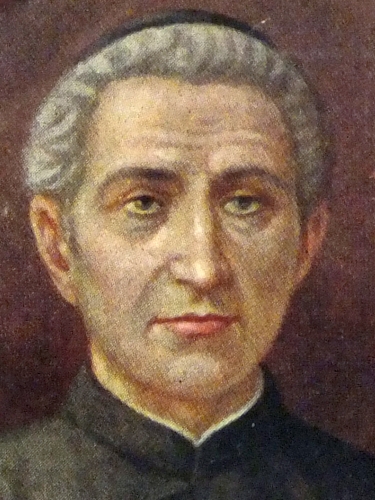1897–1978; Patron Saint of Vatican Council II; Canonized by Pope Francis on October 14, 2018
Giovanni Battista Montini was born in northern Italy, about fifty miles east of Milan. He was the second of three boys. His father was an attorney who ran a Catholic newspaper in the Province of Brescia and a member of the Italian Catholic Action, a lay organization that advocated for a greater influence of the Catholic faith within society. His mother was from a wealthy noble family, but her parents’ death when she was young resulted in her spending much of her teenage years in a boarding school in Milan run by French nuns. As a child, Giovanni was called “Battista” by his family. He was educated by Jesuits, and enjoyed sports and playing cards. When he was twelve, Battista was diagnosed with a chronic heart flutter and suffered from intestinal difficulties. He often missed long periods of school, spending time at the family villa and receiving private tutoring.
Though he had long thought of becoming a journalist like his father, Battista entered the seminary at the age of eighteen and was ordained a priest four years later. Shortly after his priestly ordination, Father Montini was sent to Rome to study canon law. Though ill health continued to plague him, he obtained his doctorate in canon law, studied for the Vatican diplomatic corps, briefly served at the Apostolic Nunciature in Warsaw, Poland, and then returned to Rome. In Rome, he began his service as a diplomat in the papal household under Pope Pius XI and assisted at the Supreme Tribunal of the Apostolic Signatura, the Holy Office, and the Secretariat of State. When Pope Pius XII was elected in 1939, Monsignor Montini worked with him daily, eventually acting as the pope’s de facto personal secretary.
In 1939, World War II broke out and Monsignor Montini assisted the pope as he navigated through the chaos. As thousands of refugees fled to Rome, Monsignor Montini organized the Vatican’s efforts to care for them, giving them shelter and food, keeping them hidden, and supporting their mental and spiritual needs. In 1952, Monsignor Montini was appointed Pro-Secretary of State for General Affairs and in 1954, was ordained the Archbishop of Milan and the Secretary of the Italian Bishops’ Conference. In Milan, Archbishop Montini’s organizational skills flourished. He built many new churches, organized diocesan-wide catechesis, and sought new and innovative ways to share the Word of God. In an attempt to confront the rise of Marxisit ideology, he showed great interest in upholding the dignity of the worker with his support of unions and immigrants. His ministry went beyond Catholics, seeking ways to reach out to other Christians, Jews, Muslims, and those without any faith.
When Pope Pius XII died in 1958, many people thought that Archbishop Montini would be a good successor. However, he was not a cardinal. It came to light later that Pope Pius XII had offered to make him a cardinal on at least two occasions, but Monsignor Montini had turned the office down. Therefore, when the college of cardinals entered the conclave to vote, they chose Cardinal Roncalli, the Patriarch of Venice, who took the name Pope John XXIII. Pope John was no stranger to Archbishop Montini and had a great fondness for him. Within a year of his papal election, the pope raised Archbishop Montini to the cardinalate and appointed him to various Vatican posts, in addition to being Archbishop of Milan. With those responsibilities, Cardinal Montini frequented the Vatican, continuing his service as a trusted papal advisor.
From 1958–1960, Cardinal Montini took a special interest in the Universal Church, making visits to several African countries, South America, the United States, and all parts of Europe. In 1961, Pope John XXIII appointed Cardinal Montini to a special commission meant to prepare for Vatican II. The pope had announced his intention to hold an ecumenical council just two years prior, much to the surprise of Cardinal Montini. Though uncertain of the wisdom of such a move, the cardinal was a loyal churchman and assisted in every way he could.
On October 11, 1962, Pope John XXIII formally opened the Second Vatican Council. In less than a year, however, the pope would die of stomach cancer. The pope’s vision for the council was to bring the ancient faith of the Church into closer connection to the modern world. He foresaw a new Pentecost, or a new springtime for the Church. The Holy Father also wanted to reach beyond the Catholic Church to seek greater union with people of all faiths and those with no faith at all. Though the central mission of the Church was to preach the saving message of Jesus Christ, he also saw the Church as a necessary institution sent by God to assist all peoples with the emerging issues of the day, such as modernization, communism, economic progress, war, and poverty. The Church needed to be an active force within every human and societal structure.
After the death of Pope John XXIII, Cardinal Montini was elected pope on June 21, 1963. His lifelong service to the Church prepared him well for the task. As pope, he re-opened and presided over the remaining sessions of the Second Vatican Council and oversaw the implementation of its schema. He also implemented new liturgical rites for the sacraments and a new liturgical calendar. Pope Paul VI was the first traveling pope, making apostolic journeys to seventeen different countries. In the Holy Land, he met with the Greek Orthodox Patriarch Athenagora of Constantinople; the two mutually lifted the excommunications imposed upon the leaders of each Church since 1054. During the rest of his journeys he exhorted churches and nations to address world peace, social justice, poverty, illiteracy, ecumenism, and world unity.
Perhaps the most difficult decision Pope Paul VI made was the promulgation of the encyclical Humanae Vitae, in which he reiterated the long-standing Church teaching on contraception. Though many bishops and theologians recommended the moral acceptance of contraception, the pope prayerfully followed his conscience, which resulted in outrage among some, especially in the Western World. He stood firm and suffered quietly through it all. His encyclical included various prophecies about what would result from the liberal use of contraception: infidelity, moral decline, diminished respect for women, governmental abuse of power, and an erroneous belief that humans have an unlimited dominion over their own bodies. Those prophecies have all come true.
Pope Saint Paul VI was one of the first popes to face the many challenges and blessings that have come from modernization. He sought to keep the ancient faith of the Church ever ancient while also making it ever new and relevant to a world in need. He sought unity among Christians, peace among nations, and respect for the dignity of all. As we honor this recent saint, ponder the effects that he has directly had upon your life. His prayerful decisions, especially regarding the way we celebrate the liturgy, have led many to engage the sacraments in a more active way, participating more fully in the sacred offering of the Most Holy Body and Blood of Christ to the Father in Heaven. Nothing in life is more important than that.
Source: https://mycatholic.life/saints/saints-of-the-liturgical-year/saint-paul-vi/

